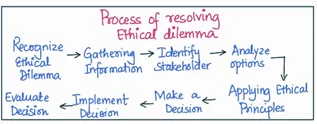UPSC CSE : 2015
Answer:
| Approach:
Introduction:
Body:
Conclusion:
|
Introduction:
Conflict of interest occurs when an individual’s personal interest or bias interferes with their ability to make impartial decisions or perform their duties objectively. In the context of public service, it refers to situations where a public servant’s private interests, financial or personal relationships, or affiliations could interfere with their ability to perform their duties in the best interest of the public.
Body:
Conflict of interest can manifest in various ways in the decision-making process by public servants:-
For example, a public servant might award a contract to a company in which they have a financial interest, or they might give preferential treatment to a family member or a friend in the recruitment process.
If faced with a conflict-of-interest situation, it is important for a public servant to identify the conflict and take steps to resolve it:-

Conclusion:
Conflict of interest is a serious ethical issue that can compromise the integrity and impartiality of public service. It is important for public servants to be aware of the issue and take steps to avoid or resolve it. By promoting transparency, accountability, and ethical behavior, public servants can build public trust and ensure that decisions are made in the best interest of the public.
<div class="new-fform">
</div>